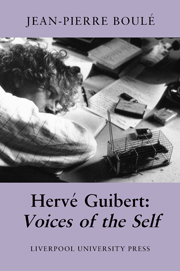Book contents
- Frontmatter
- Contents
- Acknowledgements
- List of Abbreviations
- Introduction
- 1 Youthful Writings
- 2 Photographic Writing
- 3 Towards the Novel
- 4 Image and Text
- 5 The ‘Novel’
- 6 ‘Autobiography’
- 7 Towards the roman faux
- 8 The roman faux
- 9 Thanatographical Writing
- 10 The Fictitious, the Fake or the Delirious
- Conclusion
- Notes
- Bibliography
- Index of Names
- Index of Notes
3 - Towards the Novel
- Frontmatter
- Contents
- Acknowledgements
- List of Abbreviations
- Introduction
- 1 Youthful Writings
- 2 Photographic Writing
- 3 Towards the Novel
- 4 Image and Text
- 5 The ‘Novel’
- 6 ‘Autobiography’
- 7 Towards the roman faux
- 8 The roman faux
- 9 Thanatographical Writing
- 10 The Fictitious, the Fake or the Delirious
- Conclusion
- Notes
- Bibliography
- Index of Names
- Index of Notes
Summary
This chapter will study three books, all published in 1982, along with the texts of La Piqûre d'amour et autres textes suivi de La chair fraîche dating from 1981 and 1982. None of these books bears a generic subtitle. As will be seen, Les Aventures singuliéres is an attempt at fiction, and if Guibert does not resolve all the questions that preoccupy him with respect to the creation of a novel, narrative possibilities found here in embryonic form will be developed in other books. With the last text, ‘Le Désir d'imitation’ (‘The Desire to imitate’), Guibert will find a narrative method allowing him to refine further his approach to the novel. The texts of La Piqûre d'amour et autres textes suivi de La chair fraîche will pursue with renewed vigour the progression towards the novel and will also contain theoretical reflections about the genre. Les Chiens will offer a multiplicity of narrative points of view. Voyage avec deux enfants, a work in three parts, is very important from the standpoint of this chapter since it is the first book by Guibert in which there is (in the middle of part one) an attempt at fiction preceded by a dream of a journey, followed by the journey proper and ending with reflections arising from the narrator's return to Paris. So as can be seen, there is a progression towards the novel, albeit not a strictly linear one.
- Type
- Chapter
- Information
- Hervé GuibertVoices of the Self, pp. 71 - 100Publisher: Liverpool University PressPrint publication year: 1999

